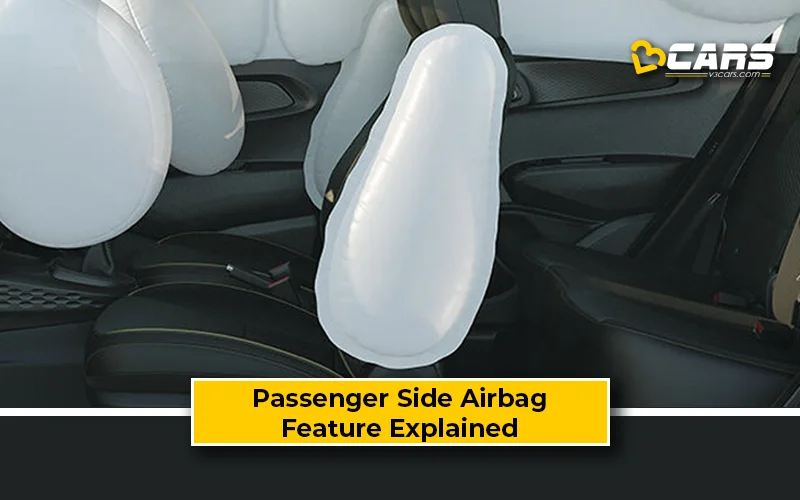Passenger Side Airbag – Feature Explained
While passenger front airbags, or frontal airbags, are designed for head-on collisions, side airbags offer crucial protection in side-impact crashes. Let’s take a closer look at passenger-side airbags and how they work to keep your co-passenger safe.

What Is A Passenger Side Airbag?
A passenger-side airbag is a safety device installed in a vehicle to protect the front passenger during a side-impact collision. Similar to the driver-side airbag, it’s typically located within the seatback or the door panel, positioned to deploy between the passenger and the intruding structure of the car or another vehicle.
How Does A Passenger Side Airbag Work?
Here’s how a passenger-side airbag works:
- Side-Impact Sensors: The vehicle is equipped with sensors, usually located in the doors, B-pillars (the vertical support structure behind the front doors), or within the side of the seats, that are specifically designed to detect a side-impact collision.
- Rapid Detection: These sensors are designed to react very quickly to the sudden change in velocity and pressure that occurs during a side-impact.
- Signal to Inflator: When a side-impact is detected, the sensors send an electrical signal to the airbag inflator.
- Airbag Inflation: The inflator uses a chemical reaction (often involving a propellant like sodium azide) to generate a large volume of gas (typically argon or nitrogen) in milliseconds. This gas rapidly fills the airbag.
- Cushioning: The inflated airbag forms a protective cushion between the passenger’s torso (chest and abdomen) and the door panel or other intruding objects. This cushion absorbs the impact energy and distributes it across the passenger’s body.
- Deflation: The airbag then quickly deflates through vents, allowing the driver and passenger to maintain some level of mobility and visibility.
What Are The Pros And Cons Of Passenger Side Airbags?
Here are the pros, or advantages of passenger side airbags:
- Reduces Side-Impact Injuries: Significantly reduces the risk of serious injuries to the chest, abdomen, and pelvis, which are common in side-impact collisions.
- Works in Conjunction with Other Systems: Passenger side airbags are designed to work in conjunction with seatbelts and the vehicle’s side structure to provide a comprehensive safety system.
Here are the cons, or disadvantages of passenger side airbags:
- Limited Head Protection: Standard side airbags primarily protect the torso. However, they offer limited protection for the head. (This is where side curtain airbags come in.)
- Minor Injuries: Like other airbags, deployment can sometimes cause minor injuries such as abrasions or burns.
- Effectiveness Can Vary: The effectiveness of side airbags can vary depending on the angle and severity of the impact.
How Does A Passenger Side Airbag Differ From Curtain Airbags?
While both passenger side airbags and curtain airbags are designed for side-impact protection, they differ in their location and the area of the body they protect. Passenger side airbags are located in the seatback or door panel and primarily protect the torso (chest and abdomen). Curtain airbags, on the other hand, are located in the roof lining (headliner) and deploy downwards to protect the head. They also offer some protection in rollover accidents.
In essence, passenger side airbags protect the body, while curtain airbags protect the head. Many higher-end vehicles use both systems for enhanced safety.
Is It Possible To Install Passenger Side Airbags From The Aftermarket?
Installing passenger-side airbags aftermarket is highly complex and generally not recommended. Here’s why:
- Complex Integration: It requires integration with the vehicle’s electronic control unit (ECU), side-impact sensors, and wiring harness.
- Reliability Concerns: Aftermarket systems may not be as reliable or thoroughly tested as factory-installed airbags.
- Safety Risks: Improper installation can lead to deployment failure, unintended deployment, or other malfunctions, potentially causing serious injury.
- Warranty Issues: Modifying a vehicle’s safety systems can void the manufacturer’s warranty.
What Is The Cost of Replacing A Passenger Side Airbag?
The cost of replacing a deployed passenger-side airbag can vary depending on several factors:
- Vehicle Make And Model: Different vehicles have different airbag systems and replacement part costs.
- Parts Required: In addition to the airbag module itself, other components like the seat upholstery or door panel may need to be replaced.
- Labour Costs: Installation costs will vary depending on the complexity of the job.
Generally, replacing a passenger-side airbag can range from Rs. 30,000 to Rs. 50,000 or more.
Note: Check your Car EMI with our - Car Loan EMI Calculator
You can use our Fuel Cost Calculator to see how much any petrol, diesel or CNG car will cost to run based on the latest fuel price in your city.



0 Comments